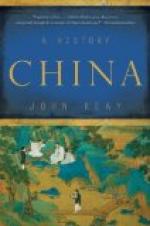[Footnote 3: Both Taoist practices.]
Thus Lao Tz[)u]’s individualist and anarchist doctrine was not suited to form the basis of a general Chinese social order, and its employment in support of dictatorship was certainly not in the spirit of Lao Tz[)u]. Throughout history, however, Taoism remained the philosophic attitude of individuals of the highest circle of society; its real doctrine never became popularly accepted; for the strong feeling for nature that distinguishes the Chinese, and their reluctance to interfere in the sanctified order of nature by technical and other deliberate acts, was not actually a result of Lao Tz[)u]’s teaching, but one of the fundamentals from which his ideas started.
If the date assigned to Lao Tz[)u] by present-day research (the fourth instead of the sixth century B.C.) is correct, he was more or less contemporary with Chuang Tz[)u], who was probably the most gifted poet among the Chinese philosophers and Taoists. A thin thread extends from them as far as the fourth century A.D.: Huai-nan Tz[)u], Chung-ch’ang T’ung, Yuean Chi (210-263), Liu Ling (221-300), and T’ao Ch’ien (365-427), are some of the most eminent names of Taoist philosophers. After that the stream of original thought dried up, and we rarely find a new idea among the late Taoists. These gentlemen living on their estates had acquired a new means of expressing their inmost feelings: they wrote poetry and, above all, painted. Their poems and paintings contain in a different outward form what Lao Tz[)u] had tried to express with the inadequate means of the language of his day. Thus Lao Tz[)u]’s teaching has had the strongest influence to this day in this field, and has inspired creative work which is among the finest achievements of mankind.
Chapter Four
THE CONTENDING STATES (481-256 B.C.): DISSOLUTION OF THE FEUDAL SYSTEM
1 Social and military changes




